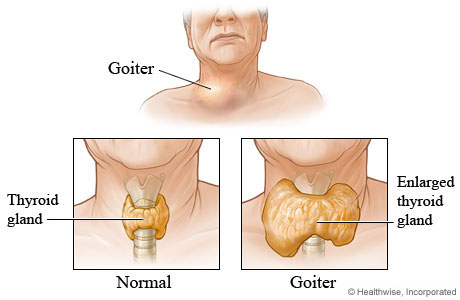It's Goiter discussion time boys & girls!
I know, I know, you are asking yourself, "What the hey is a goiter?"
Well, if you have been so lucky as to avoid this unpleasant thing that leads to a host of other unpleasant things, now you must prepare to be enlightened! Let's start with legitimate sources for our definition.
The Mayo Clinic defines a goiter as the following:
Goiter (GOI-tur) is an abnormal enlargement of your thyroid gland. Your thyroid is a butterfly-shaped gland located at the base of your neck just below your Adam's apple. Although goiters are usually painless, a large goiter can cause a cough and make it difficult for you to swallow or breathe.
The most common cause of goiter worldwide is a lack of iodine in the diet. In the United States, where the use of iodized salt is common, a goiter is more often due to the over- or underproduction of thyroid hormones or to nodules that develop in the gland itself.
Treatment depends on the size of the goiter, your symptoms and the underlying cause. Small goiters that aren't noticeable and don't cause problems usually don't need treatment.
Thank you Mayo Clinic!
Goiters are warnings, they are your bodies way of saying something is not right. This means we need to seek help if a goiter is suspected, even when they are small, they need to be monitored regularly by a doctor specializing in Endocronology. The reason being is that, while many goiters are benign, they can become cancerous.
I have included some pictures down below, to show you what a goiter looks like.
(Warning, if you have a queasy and or delicate constitution, you may want to skip the pics that follow. They are important though, so try to view them.
Here it is:

This is what it can look like on a person:


Goiters can effect both men and women, they begin small but as the thyroid worsens, goiters begin to swell and make their presence rather obvious. To reiterate: It is not a good idea to leave goiters untreated as they can lead to cancer.
A goiter can also be signaled by bulging eyes:
They can be a pretty harrowing experience to live through. Along with the swelling there can be extreme fatigue, nutritional deficiency, hormonal imbalances, rapid weight gain or loss, a feeling of tightness or discomfort around neck, difficulty swallowing, voice changes, digestion issues, depression, (The list could go on but I will stop here for now because this leads to graves & hashimoto's which was in an earlier post.) when a goiter becomes too enlarged and or cancerous, surgery is required. (Warning, next pic is VERY medically graphic)

Who can get a goiter? Well read next what the Mayo Clinic has to say about that:
Goiters can affect anyone. They may be present at birth and occur at any time throughout life, although they're more common after age 40. Some common risk factors for goiter include:
I know, I know, you are asking yourself, "What the hey is a goiter?"
Well, if you have been so lucky as to avoid this unpleasant thing that leads to a host of other unpleasant things, now you must prepare to be enlightened! Let's start with legitimate sources for our definition.
The Mayo Clinic defines a goiter as the following:
Goiter (GOI-tur) is an abnormal enlargement of your thyroid gland. Your thyroid is a butterfly-shaped gland located at the base of your neck just below your Adam's apple. Although goiters are usually painless, a large goiter can cause a cough and make it difficult for you to swallow or breathe.
The most common cause of goiter worldwide is a lack of iodine in the diet. In the United States, where the use of iodized salt is common, a goiter is more often due to the over- or underproduction of thyroid hormones or to nodules that develop in the gland itself.
Treatment depends on the size of the goiter, your symptoms and the underlying cause. Small goiters that aren't noticeable and don't cause problems usually don't need treatment.
Thank you Mayo Clinic!
Goiters are warnings, they are your bodies way of saying something is not right. This means we need to seek help if a goiter is suspected, even when they are small, they need to be monitored regularly by a doctor specializing in Endocronology. The reason being is that, while many goiters are benign, they can become cancerous.
I have included some pictures down below, to show you what a goiter looks like.
(Warning, if you have a queasy and or delicate constitution, you may want to skip the pics that follow. They are important though, so try to view them.
Here it is:

This is what it can look like on a person:

Goiters can effect both men and women, they begin small but as the thyroid worsens, goiters begin to swell and make their presence rather obvious. To reiterate: It is not a good idea to leave goiters untreated as they can lead to cancer.
A goiter can also be signaled by bulging eyes:
They can be a pretty harrowing experience to live through. Along with the swelling there can be extreme fatigue, nutritional deficiency, hormonal imbalances, rapid weight gain or loss, a feeling of tightness or discomfort around neck, difficulty swallowing, voice changes, digestion issues, depression, (The list could go on but I will stop here for now because this leads to graves & hashimoto's which was in an earlier post.) when a goiter becomes too enlarged and or cancerous, surgery is required. (Warning, next pic is VERY medically graphic)

Who can get a goiter? Well read next what the Mayo Clinic has to say about that:
Goiters can affect anyone. They may be present at birth and occur at any time throughout life, although they're more common after age 40. Some common risk factors for goiter include:
- A lack of dietary iodine. People living in areas where iodine is in short supply and who don't have access to iodine supplements are at high risk of goiter.
- Being female. Because women are more prone to thyroid disorders, they're also more likely to develop goiters.
- Your age. Your chances of developing a goiter increase with age.
- Medical history. A personal or family history of autoimmune disease increases your risk.
- Pregnancy and menopause. For reasons that aren't entirely clear, thyroid problems are more likely to occur during pregnancy and menopause.
- Certain medications. Some medical treatments, including immunosuppressants, antiretrovirals, the heart drug amiodarone (Cordarone, Pacerone, others) and the psychiatric drug lithium (Lithobid, others), increase your risk.
- Radiation exposure. Your risk increases if you've had radiation treatments to your neck or chest area or you've been exposed to radiation in a nuclear facility, test or accident.
Thyroid Goiter Treatments


 A more common indication for surgical removal of an enlarged thyroid is to remove those glands that are large enough to cause compression on other structures in the neck, such as the trachea and esophagus.
A more common indication for surgical removal of an enlarged thyroid is to remove those glands that are large enough to cause compression on other structures in the neck, such as the trachea and esophagus.






















This is all horrible! Abba Father!
ReplyDeleteIts great info you shared here! A goiter is an enlarged thyroid gland that causes the neck to swell. It is one of the most common thyroid disorders. Goiters are often harmless but symptoms can occur, and treatment may be required depending on the size and type of goiter.
ReplyDeleteherbal medicine for thyroid